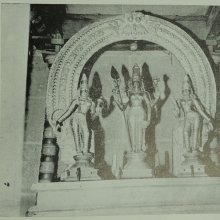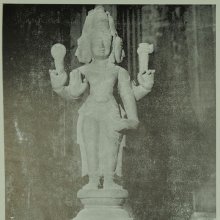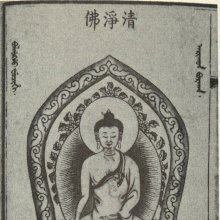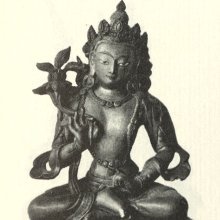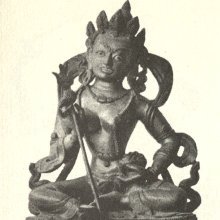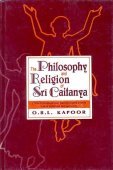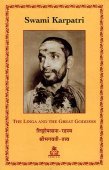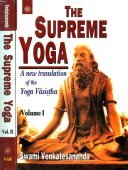Brahman: 26 definitions
Introduction:
Brahman means something in Buddhism, Pali, Hinduism, Sanskrit, the history of ancient India, Hindi. If you want to know the exact meaning, history, etymology or English translation of this term then check out the descriptions on this page. Add your comment or reference to a book if you want to contribute to this summary article.
Brahman has 25 English definitions available.
Images (photo gallery)
(+11 more images available)
Languages of India and abroad
Sanskrit dictionary
[Deutsch Wörterbuch]
Source: Cologne Digital Sanskrit Dictionaries: Böhtlingk and Roth Grosses Petersburger WörterbuchBrahman (ब्रह्मन्):—
--- OR ---
Brahman (ब्रह्मन्):—
--- OR ---
Brahman (ब्रह्मन्):—1.
5) Enthaltsamkeit bei den Jaina [SARVADARŚANAS. 33, 8.] —
6) asti tāvannityaśuddhabuddhamuktasvabhāvaṃ sarvajñaṃ sarvaśaktisamanvitaṃ brahma [] zu [BRAHMAS. 33, 1. 2. 53, 7. 110, 1.] vāsudevaḥ paraṃ brahma [SARVADARŚANAS. 54, 15. fgg.]
--- OR ---
Brahman (ब्रह्मन्):—2.
14) Bez. des 9ten Muhūrta [Weber’s Indische Studien 10, 296.]
--- OR ---
Brahman (ब्रह्मन्):—1.
5) (Nachträge) [Hemacandra] [Yogaśāstra 1, 23. 3, 92. 4, 92.]
Source: Cologne Digital Sanskrit Dictionaries: Sanskrit-Wörterbuch in kürzerer FassungBrahman (ब्रह्मन्):—1. n. —
1) die als Drang und Fülle des Gemüths auftretende und den Göttern zustrebende Andacht überh. jede fromme Aeusserung beim Gottesdienst. —
2) ein heiliger Spruch , namentlich Zauberspruch und auch schon die blosse heilige Silbe om. —
3) das heilige Wort , Gotteswort , der Veda. —
4) heilige Weisheit , Theologie , Theosophie. —
5) heiliges Leben , insbes. Enthaltsamkeit , Keuschheit. —
6) der höchste Gegenstand der Theosophie , der unpersönlich gedachte Gott , das Absolutum. Auch mit den Beisätzen jyeṣṭha prathamaja svayaṃbhu āmūrta para paratara parama mahat sanātana śāśvata. Ausnahmsweise auch als m. construirt. —
7) der Stand , welcher Inhaber und Pfleger des heiligen Wissens ist , die Theologen , Klerisei , Brahmanenschaft. Ausnahmsweise auch vom einzelnen Brahmanen gebraucht. —
8) Speise. —
9) Reichthum.
--- OR ---
Brahman (ब्रह्मन्):—2. m. —
1) Beter , Andächtiger und dann Beter von Beruf , d.h. Priester , Brahmane ; auch Kenner der heiligen Sprüche (Zaubersprüche) , des heiligen Wissens überh. Auch von Monde gebraucht. —
2) Kenner des heiligen Wissens im engern Sinne ; derjenige Hauptpriester , welcher die Leitung des Opfers hat und die drei Veda kennen soll. —
3) der Gehülfe von
2) beim Soma-Opfer. —
4) der oberste Gott des indischen Pantheons , der Schöpfer der Welt. Daher auch auf die Pragāpati übertragen. —
5) so v.a. brahmaṇa āyuḥ Brahman’s Lebensdauer. —
6) die Sonne. —
7) Beiname Śiva’s —
8) angeblich der Veda [Pāraskara’s Gṛhyasūtra 3,3,6.] —
9) der Intellect. —
10) ein best. Stern , δ aurigae. —
11) ein best. Yoga. —
12) Bez. des 9ten Muhūrta. —
13) Nomen proprium des Dieners des 10ten Arhant’s der gegenwärtigen Avasarpiṇī — b) eines Zauberes.
Sanskrit, also spelled संस्कृतम् (saṃskṛtam), is an ancient language of India commonly seen as the grandmother of the Indo-European language family (even English!). Closely allied with Prakrit and Pali, Sanskrit is more exhaustive in both grammar and terms and has the most extensive collection of literature in the world, greatly surpassing its sister-languages Greek and Latin.
See also (Relevant definitions)
Starts with (+489): Brahma-muhurta, Brahmabala, Brahmabandhu, Brahmabhaga, Brahmabhava, Brahmabhavana, Brahmabhid, Brahmabhumija, Brahmabhuta, Brahmabhuti, Brahmabhuvana, Brahmabhuya, Brahmabhuyasa, Brahmabhyasa, Brahmabija, Brahmabindu, Brahmabruva, Brahmabruvana, Brahmacakra, Brahmacarika.
Ends with (+13): Abrahma, Annabrahman, Ashabdabrahman, Asubrahman, Atibrahman, Bhutabrahman, Brihadbrahman, Candraskandharcitabrahman, Chandraskandharchitabrahman, Dandabrahman, Daun brahman, Devabrahman, Haribrahman, Hariharabrahman, Kritabrahman, Kubrahman, Mahabrahman, Nirguna-brahman, Ohabrahman, Pancabrahman.
Full-text (+3190): Abrahma, Brahmana, Brahmani, Brahmavrinda, Shabdabrahman, Brahmaṇya, Parabrahman, Brahmasamsad, Brahmaghataka, Brahmanvat, Brahmya, Brahmanvati, Brahmastra, Brahma, Brahmabhava, Brahmanirvana, Devabrahmana, Brahmajya, Brahmasva, Paitamaha.
Relevant text
Search found 319 books and stories containing Brahman, Brahmaṇ; (plurals include: Brahmans, Brahmaṇs). You can also click to the full overview containing English textual excerpts. Below are direct links for the most relevant articles:
Chandogya Upanishad (Madhva commentary) (by Srisa Chandra Vasu)
Fourth Adhyaya, Fourth through Ninth Khandas (23 mantras)
Second Adhyaya, Fourteenth through Twenty-first Khandas (9 mantras)
Manusmriti with the Commentary of Medhatithi (by Ganganatha Jha)
Verse 2.226 < [Section XXX - Rules to be observed by the Religious Student]
Verse 6.84 < [Section VII - Means of Removing Sin (kilbiṣa)]
Verse 2.83 < [Section XVII - Rules of Study]
The Vishnu Purana (by Horace Hayman Wilson)
Chapter XV - What Brahmans are to be entertained at Shraddhas < [Book III]
Chapter VIII - How Vishnu is to be worshipped < [Book III]
Chapter VI - Division of the Sama-veda < [Book III]
Shaiva Upanishads (A Critical Study) (by Arpita Chakraborty)
8. Pañcabrahma Vidyā < [Chapter 5 - Essence of Pañcabrahma Upaniṣad]
1. Pañcabrahma Upaniṣad (Introduction) < [Chapter 5 - Essence of Pañcabrahma Upaniṣad]
6. The form of Īśāna < [Chapter 5 - Essence of Pañcabrahma Upaniṣad]
The Gospel of Buddha (by Paul Carus)
Related products
(+7 more products available)
